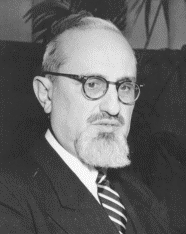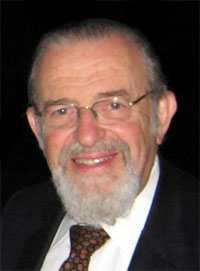Related Research Articles

Orthodox Judaism is the collective term for the traditionalist branches of contemporary Judaism. Theologically, it is chiefly defined by regarding the Torah, both Written and Oral, as revealed by God to Moses on Mount Sinai and faithfully transmitted ever since.

A kollel or colel is an institute for full-time, advanced study of the Talmud and rabbinic literature. Like a yeshiva, a kollel features shiurim (lectures) and learning sedarim (sessions); unlike a yeshiva, the student body of a kollel consists mostly of married men. A kollel generally pays a regular monthly stipend to its members.

Jacob Ettlinger was a German rabbi and author, and one of the leaders of Orthodox Judaism. He is sometimes referred to as the Aruch la-Ner, after his best-known publication.
Modern Orthodox Judaism is a movement within Orthodox Judaism that attempts to synthesize Jewish values and the observance of Jewish law with the secular, modern world.

Joseph Ber Soloveitchik was a major American Orthodox rabbi, Talmudist, and modern Jewish philosopher. He was a scion of the Lithuanian Jewish Soloveitchik rabbinic dynasty.

Norman Lamm was an American Modern Orthodox rabbi, scholar, academic administrator, author, and Jewish community leader. He was the Chancellor of Yeshiva University until he announced his retirement on July 1, 2013.

Moses Schreiber (1762–1839), known to his own community and Jewish posterity in the Hebrew translation as Moshe Sofer, also known by his main work Chatam Sofer, Chasam Sofer, or Hatam Sofer, was one of the leading Orthodox rabbis of European Jewry in the first half of the nineteenth century.
Torah Umadda is a worldview in Orthodox Judaism concerning the relationship between the secular world and Judaism, and in particular between secular knowledge and Jewish religious knowledge. The resultant mode of Orthodox Judaism is referred to as Centrist Orthodoxy.

Yeshiva Torah Vodaath is a yeshiva in the Kensington neighborhood of Brooklyn, New York.
Judah David Bleich is an authority on Jewish law and ethics, including Jewish medical ethics. He is a professor of Talmud at the Rabbi Isaac Elchanan Theological Seminary, an affiliate of Yeshiva University, as well as head of its postgraduate institute for the study of Talmudic jurisprudence and family law. At Yeshiva University, he holds the Herbert and Florence Tenzer Chair in Jewish Law and Ethics. He also teaches at Cardozo Law School. He is married to Dr. Judith Bleich, a historian of 19th-century European Jewry.
Yeshivat Chovevei Torah Rabbinical School (YCT) is a Open Orthodox yeshiva, founded in 1999 by Rabbi Avi Weiss.

Rabbi Yechiel Yaakov Weinberg (1884–1966) was a noted Orthodox rabbi, posek and rosh yeshiva. He is best known as the author of the work of responsa Seridei Eish.

Professor Adam S. Ferziger is an intellectual and social historian whose research focuses on Jewish religious movements and religious responses to secularization and assimilation in modern and contemporary North America, Europe and Israel. Ferziger holds the Samson Raphael Hirsch Chair for Research of the Torah with Derekh Erez Movement in the Department of Jewish History and Contemporary Jewry at Bar-Ilan University, Ramat Gan, Israel. He is a senior associate at the Oxford Centre for Hebrew and Jewish Studies and is co-convener of the annual Oxford Summer Institute for Modern and Contemporary Judaism. He has served as a visiting professor/fellow in College of Charleston (2017), Wolfson College, University of Oxford, UK (2013), University of Sydney, New South Wales, Australia (2012), and University of Shandong, Jinan, China (2005). In 2011, he received Bar-Ilan's "Outstanding Lecturer" award. Ferziger has published articles in leading academic journals of religion, history, and Jewish studies and is the author or editor of seven books including: Exclusion and Hierarchy: Orthodoxy, Nonobservance and the Emergence of Modern Jewish Identity ; Orthodox Judaism – New Perspectives, edited with Aviezer Ravitzky and Yoseph Salmon ; and most recently Beyond Sectarianism: The Realignment of American Orthodox Judaism, which was the winner of a 2015 National Jewish Book Award.

Yochanan Sofer was the Rebbe of the Erlau dynasty,which though not the largest in the number of its adherents is still a significant movement within Haredi Judaism. He was born in Eger (German: Erlau), Hungary, where his father and grandfather served as Grand Rabbis. After surviving the Holocaust, he continued their legacy by founding a yeshiva and a movement in their name, first in Hungary and then a few years later in Jerusalem.

Women rabbis are individual Jewish women who have studied Jewish Law and received rabbinical ordination. Women rabbis are prominent in Progressive Jewish denominations, however, the subject of women rabbis in Orthodox Judaism is more complex. Although Orthodox women have been ordained as rabbis, many major Orthodox Jewish communities and institutions do not accept the change. In an alternative approach, other Orthodox Jewish institutions train women as Torah scholars for related Jewish religious roles. These roles typically involve training women as religious authorities in Jewish Law but without formal rabbinic ordination, instead, alternate titles are used. Yet, despite this alteration in title, these women are often perceived as equivalent to ordained rabbis. Since the 1970s, over 1,200 Jewish women have been ordained as rabbis.
Erlau, is a Haredi dynasty of Hungarian origin, which follows the teachings of the Chasam Sofer and is often considered Hasidic.
Meir Yaakov Soloveichik is an American Orthodox rabbi and writer. He is the son of Rabbi Eliyahu Soloveichik, grandson of the late Rabbi Ahron Soloveichik and the great nephew of Rabbi Joseph B. Soloveitchik, the late leader of American Jewry who identified with what became known as Modern Orthodoxy.

Orthodox Jewish philosophy comprises the philosophical and theological teachings of Orthodox Judaism. Though Orthodox Judaism sees itself as the heir of traditional rabbinic Judaism, the present-day movement is thought to have first formed in the late 18th century, mainly in reaction to the Jewish emancipation and the growth of the Haskalah and Reform movements. Orthodox Jewish philosophy concerns itself with interpreting traditional Jewish sources, reconciling the Jewish faith with the changes in the modern world and the movement's relationships with the State of Israel and other Jewish denominations.
Rabbi Solomon Eger was an influential rabbi and successor of his father as the rabbi of Posen, then in Germany.
References
- 1 2 Bleich, Judith (2008). "Ish Yehudi: The Life and the Legacy of a Torah Great, Rav Joseph Tzvi Carlebach". Jewish Action. Archived from the original on 27 March 2010. Retrieved 5 January 2011.
- ↑ Ziring, Jonathan (22 October 2010). "An Interview with Rabbi Robert Hirt". Kol Hamevaser. Retrieved 5 January 2011.
- 1 2 "Contemporary Authors, New Revision Series". highbeam.com. 1 January 2009. Archived from the original on 4 July 2011. Retrieved 5 January 2011.
- ↑ "Touro College 2005-2007 Bulletin" (PDF). Touro College. p. 207. Archived from the original (PDF) on 28 May 2010. Retrieved 5 January 2011.
- ↑ Myers, Jody (February 1987). "Attitudes Toward a Resumption of Sacrificial Worship in the Nineteenth Century". Modern Judaism. Oxford University Press. 7 (1): 48 (note 48). doi:10.1093/mj/7.1.29.
- 1 2 3 "Dr. Judith Bleich". Touro College. 3 December 2004. Retrieved 5 January 2011.
- ↑ Bleich, Judith (Summer–Autumn 1980). "The Emergence of an Orthodox Press in Nineteenth-Century Germany". Jewish Social Studies. Indiana University Press. 42 (3/4): 323–344. JSTOR 4467098.
- ↑ Ferziger, Adam S. (2010). "Eger, Akiva ben Mosheh — Suggested Reading". YIVO Institute for Jewish Research. Retrieved 5 January 2011.
- ↑ Shmidman, Michael A. Turim: Studies in Jewish history and literature presented to Dr. Bernard Lander. Touro College Press. pp. 1–28. ISBN 9780881259599.
- ↑ Wolpin, Nisson (2000). The Ethical Imperative: Torah perspectives on ethics and values. Mesorah Publications Ltd. ISBN 1-57819-508-X.
- ↑ Schiffman, Lawrence; Wolowelsky, Joel B. (2007). War and Peace in the Jewish Tradition. Yeshiva University Press. ISBN 0-88125-945-4.